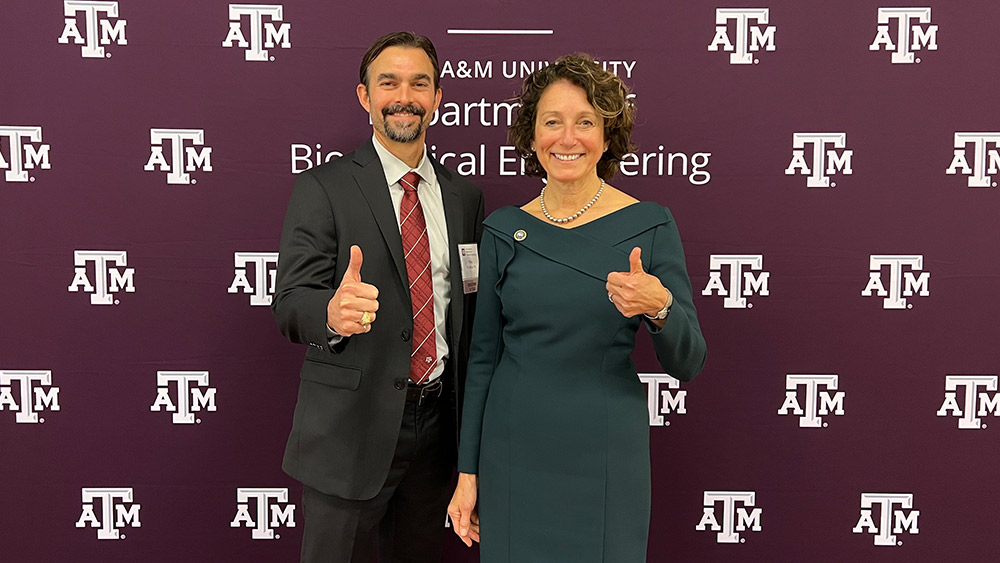
Three members of the National Academy of Engineering spoke at the 50th-anniversary celebration of the Department of Biomedical Engineering at Texas A&M University. These prominent researchers shared their visions of how biomedical engineering will change the world, starting at Texas A&M.
The department was thrilled to welcome Drs. Susan S. Margulies, Lihong Wang and Roderic I. Pettigrew during the day-long symposium, which kicked off the department’s celebration of its 50th anniversary. Each speaker gave an hour-long presentation to more than 400 students, faculty, staff and researchers from around the country.
“As one of the oldest biomedical engineering programs in the country, we are proud to celebrate our history,” said Dr. Mike McShane, department head and James J. Cain Professor II. “We have grown into a department with nearly 30 faculty members and over 650 undergraduate and graduate students. The increasing importance of our discipline was highlighted by these three outstanding researchers.”
Margulies opened the symposium with her presentation about the National Science Foundation’s (NSF) mission to advance national health. Margulies serves as an assistant director for NSF, where she is the head of the Directorate for Engineering and oversees its operations and $800 million research budget. She concurrently serves as a professor and Georgia Research Alliance Eminent Scholar at the Georgia Institute of Technology and Emory University.
“Expanding and diversifying the biomedical engineering workforce is critical,” Margulies said. “It is important to recognize that NSF is the home for biomedical engineering ideas that really transform human health, the health of the nation and the health of the planet.”
During her presentation Margulies highlighted the NSF’s successful investments in research centers, such as the Precise Advanced Technologies and Health Systems for Underserved Populations (PATHS-UP) Engineering Research Center at Texas A&M, and looked forward to a promising future for research in the biomedical field.
“Many great things have come from our large investments over the last ten years in engineering research centers,” Margulies said. “I have great expectations that the PATHS-UP center here at Texas A&M will be the same.”
Wang, professor and executive officer for the Andrew and Peggy Cherng Department of Medical Engineering at the California Institute of Technology, presented his biomedical imaging research. As a former faculty member in the Department of Biomedical Engineering at Texas A&M, Wang spoke about how Texas A&M influenced his career.
“Within days of receiving my offer letter, I joined the faculty,” Wang said. “I was very grateful for the opportunity because, as an unproven product, Texas A&M gave me the opportunity to prove myself. It turned out to be a great place to build my career.”
Wang spoke about the department’s growth and goal to give researchers the space and funding to pursue their research passions.
“The research expenditures at Texas A&M have surpassed $20 million,” Wang said. “That’s a mind-boggling number. Most of my highly cited works were actually done at Texas A&M, so I’m really proud of those works. The department provided everything I needed to do a good job.”
Pettigrew concluded the symposium with a presentation about how the biomedical engineering field is changing and how it will improve human health in the future. At Texas A&M, Pettigrew serves as a professor in biomedical engineering, dean of the School of Engineering Medicine, CEO of Engineering Health and Robert A. Welch Chair in Chemistry.
Throughout his presentation about the future of biomedical engineering, Pettigrew challenged attendees to continue to grow, question their beliefs and look toward the future.
“If we think today as we thought yesterday, we rob ourselves of tomorrow,” Pettigrew said.
At the conclusion of the symposium, the department continued its 50th-anniversary celebration with an awards banquet that recognized outstanding faculty, staff and students.
“Aggie biomedical engineers are leaders,” McShane said. “They are innovators in existing companies, entrepreneurs and academic researchers who are partnering with clinicians to drive change. We are very proud of our 50 years of service, but we’re not done yet. We’re looking forward to bigger goals, a growing department and better health for all of mankind.”